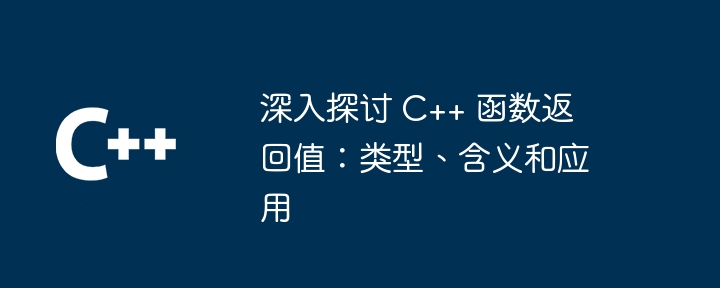
C Function return values can be of various types, including basic types, class types, reference types and pointer types. They indicate the purpose and status of a function and are used for error handling, data passing, and control flow. For example, a function that calculates the average returns a double value that represents the average of two integers.

In-depth discussion of C function return values: types, meanings and applications
In C, function return values are a basic concept , which determines the purpose and usage of the function. Understanding function return values is critical because it helps you write reliable, maintainable code.
Types
Functions in C can have values of different types:
Meaning
The return value can indicate whether the function successfully performed its task:
Application
Function return values can be used for a variety of purposes:
Practical case
Consider a function that calculates the average of two integers:
double calculateAverage(int num1, int num2) {
return (num1 + num2) / 2.0;
}The return value type of this function is double because it returns the average of two integers, which may be a decimal.
We can use this function in the main function as shown below:
int main() {
int num1 = 10;
int num2 = 20;
double average = calculateAverage(num1, num2);
cout << "Average: " << average << endl;
return 0;
}This code will print the average of two integers, which is 15.0.
The above is the detailed content of A Deep Dive into C++ Function Return Values: Types, Meanings, and Applications. For more information, please follow other related articles on the PHP Chinese website!
 Python return value return usage
Python return value return usage
 How to solve the problem that scanf return value is ignored
How to solve the problem that scanf return value is ignored
 The eight most commonly used functions in excel
The eight most commonly used functions in excel
 What are the differences between c++ and c language
What are the differences between c++ and c language
 Recommended learning order for c++ and python
Recommended learning order for c++ and python
 Cost-effectiveness analysis of learning python and c++
Cost-effectiveness analysis of learning python and c++
 Is c language the same as c++?
Is c language the same as c++?
 Which is better to learn first, c language or c++?
Which is better to learn first, c language or c++?




